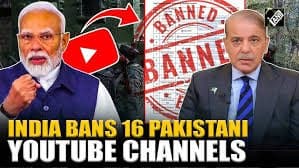
So here’s the big news — the Indian government has cracked down hard, banning dozens of Pakistani YouTube channels for spreading misinformation, propaganda, and what they’ve called “anti-India narratives.” It’s not the first time something like this has happened, and it probably won’t be the last.
But now, people are asking a pointed question: If foreign propaganda is being silenced, what about the pro-Pakistani content coming from within our own borders?
The Crackdown
This latest round of bans targeted over 30 YouTube channels — many of them pushing conspiracy theories or distorted news about Kashmir, Indian armed forces, and sensitive internal affairs. The Ministry of Information & Broadcasting used emergency powers under the IT Rules, 2021 to issue the blocks, citing national security.
Fair enough, right?
But Here’s the Catch…
While banning foreign propaganda is one thing, there’s growing frustration about a different issue — certain Indian influencers, vloggers, and even pseudo-journalists who echo similar narratives but operate freely inside India. Some openly praise Pakistan’s government or military, some share misleading stories that align with Islamabad’s line, and a few even try to whitewash cross-border terrorism.
Critics say this double standard makes no sense. If India’s taking such a tough stand on foreign content, why turn a blind eye when it’s coming from within?
Free Speech or Double Standards?
Now, this is where it gets tricky. Free speech is a cornerstone of democracy, and even controversial opinions are often protected — as long as they don’t break the law. But where’s the line between free expression and anti-national propaganda? That’s the hot-button debate right now, and people are fired up on both sides.
What Comes Next?
For now, Pakistani channels are off the Indian internet — but don’t expect this issue to go quiet. The calls to crack down on all forms of anti-India content, no matter where it’s coming from, are only getting louder. Whether the government acts on that remains to be seen.





